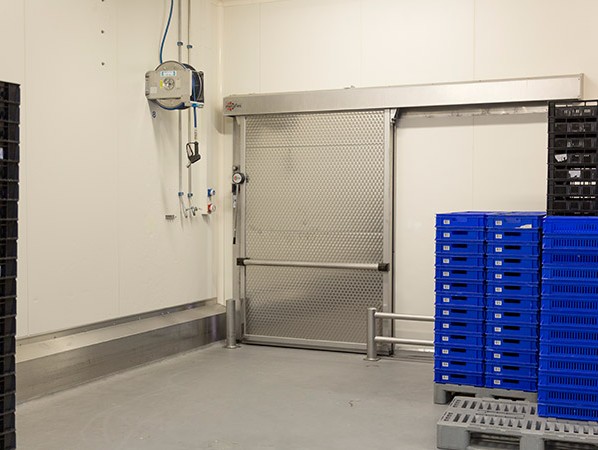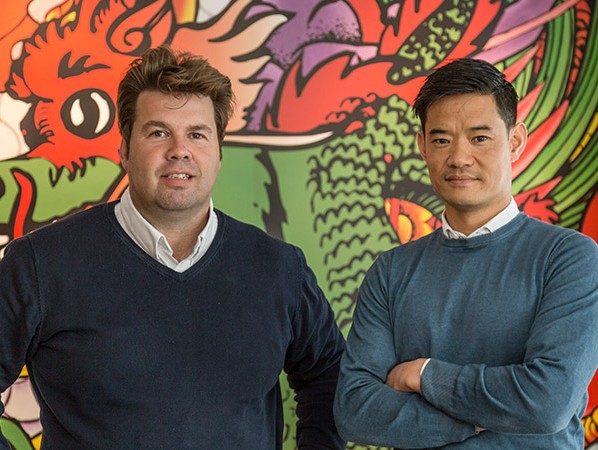
Conditioning needs to be extremely on point when it comes to daily fresh meal preparation. Padifood, which processes many fresh ingredients for authentic Asian ready-made meals, commissioned Prodoor to renovate industrial doors. “Truly thinking along leads to doors with customised functionality. The effect on product quality and energy costs is significant.”
“We strive for restaurant quality”, says director Leon Thé from Padifood. “We want to have our daily fresh Asian meals taste just as good as in a restaurant. The hospitality industry forms the foundation for Padifood. Fifty years ago, his father Theo Thé and mother emigrated to the Netherlands and started an authentic Chinese-Indian restaurant (Padihoeve). Just over twenty years ago, they founded Padifood. This ever-expanding family business has always remained true to the purely traditional food preparation in the wok. Leon Thé: “Top-quality ingredients and traditional recipes connect to the current demands of retailers and food service companies.”
How do you make the difference in quality? Internally well-trained wok chefs prepare the traditional Asian recipes. The high production requirements are shown by fully preparing their own semi-finished products, as Leon calls it. “We process raw fresh meat and eggs. We marinate our hand-cut meat cubes ourselves. We also cook our products. We import rice, noodles, soy sauce and spices from Asia ourselves.” In addition to Indonesian and Chinese daily fresh products, Padifood is now also making Japanese, Thai and Indian variants. “Only a chef from the relevant country develops the recipe. The taste experience must be 100% accurate. This is how we maintain our quality image, even though we often manufacture in small batches in accordance with the customer demand”, Leon explains. The freshly prepared oriental dishes from Padifood can be found in more and more supermarkets. With customers like Plus, Coop, Albert Heijn, Dekamarkt and Delhaize. They mainly as for restaurant quality and usually sell under a private label. “Our ambition is to increase our clientele in both food service and abroad.”
Padifood in Oss, with approximately 200 employees, expanded in 2002, and a second 5,000 m² plant followed in 2016. This latest building was built to be future-proof. “We respond to the increasing demand for healthy food and convenience. The factory is also equipped with a high care room for, among other things, topping off satay and ultra-fresh meals. This way, we expand on both our innovation strategy and our high quality level”, Leon explains. Padifood sets the same high requirements for the conditioning of all storage and processing areas. It found a suitable partner in door specialist Prodoor. “Food safety is very important. Our meals must reach consumers as fresh as possible. Properly sealing rooms contribute to a longer shelf life and lower energy consumption. So we want good advice about industrial doors with service and maintenance from a party that specialises in food environments and knows the NVWA requirements.” Ronnie Schiltmans, director of Prodoor: “K.I.M. Nederland sub-contracted the interior doors to Prodoor in 2016. This is how Padifood came into contact with our team of employees, which had professionalised significantly in recent years. The trust this created resulted in a two-year renovation assignment”.

Ronnie Schiltmans (left) and Leon Thé
Outdated doors were replaced, others from 1995 and 2002 were revised. The service engineers install, among other things, new sealing rubbers, fittings and bearings for sliding doors. Ronnie: “During the advisory process, Prodoor first maps all circumstances and environmental factors. A space in which many forklifts drive around will receive the most robust door there is. A high-speed door made of PVC cloth is advised for, for instance, highly-frequency passages or if there is a smaller temperature difference. All new Padifood doors are made of stainless steel that is resistant to moisture and cleaning. This is of particular importance in food production areas. The energy savings after the renovation? About 20% per year”.
The production process at Padifood must always continue. That is why work, including hygiene planning, often takes place in the evening and during the weekends. The breakdown service is available 24/7. For instance, an electrical door may malfunction due to collision or water damage. That is why doors in food production areas must be able to withstand high-pressure cleaning without any problem. Where Prodoor used to be a door supplier, it is now a proactive engineering party. In addition, as an installation partner, it provides sluice connections between multiple doors and other electrical components such as roller tracks and AGVs. Leon from Padifood: “Prodoor is heavily involved and communication lines are short. And you always deal with the same professionals. They actively think with you regarding improvements from an early stage. And Prodoor is committed to the smartest, most sustainable solution”.
www.padifood.nl
www.prodoor.nl
Images: ©STUDIO 38C
Source: © Vakblad Voedingsindustrie juni